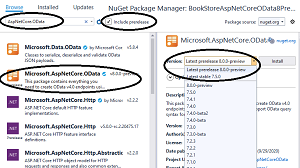News
ASP.NET Core OData 8 Preview Supports .NET 5, but with Breaking Changes
ASP.NET Core OData, which debuted in July 2018, is out in a v8.0 preview that for the first time supports the upcoming .NET 5 milestone release, slated for Nov. 10.
Microsoft's open source OData -- standing for Open Data Protocol -- is used for creating and consuming queryable and interoperable REST APIs in a simple and standard way, breaking onto the data development scene back in 2007.
 [Click on image for larger view.] Creating an ASP.NET Core OData 8 Web App (source: Microsoft).
[Click on image for larger view.] Creating an ASP.NET Core OData 8 Web App (source: Microsoft).
Earlier this year Microsoft engineer Sam Xu announced "it's time to move OData to .NET 5," and yesterday he announced that was a done deed in ASP.NET OData 8.0 Preview for .NET 5.
"It is the first version of OData supporting .NET 5, especially for ASP.NET Core 5," he said.
But it comes with a catch.
"This version includes some breaking changes, such as model builder separation, namespace changes and configuration changes etc. Most importantly, the routing mechanism is changed a lot comparing to the previous 7.x version."
Thus Xu's Oct. 19 blog post is largely devoted to helping developers work through the changes in a basic bookstore tutorial using a Visual Studio 2019 preview to create an ASP.NET Core 5.0 web application, which can be found on GitHub for those wanting to follow along. The main ASP.NET Core (.NET 5) OData project is also hosted on GitHub.
Because the routing changes were deemed most significant, Xu promised an upcoming post on "routing in ASP.NET Core OData 8.0."
About the Author
David Ramel is an editor and writer at Converge 360.